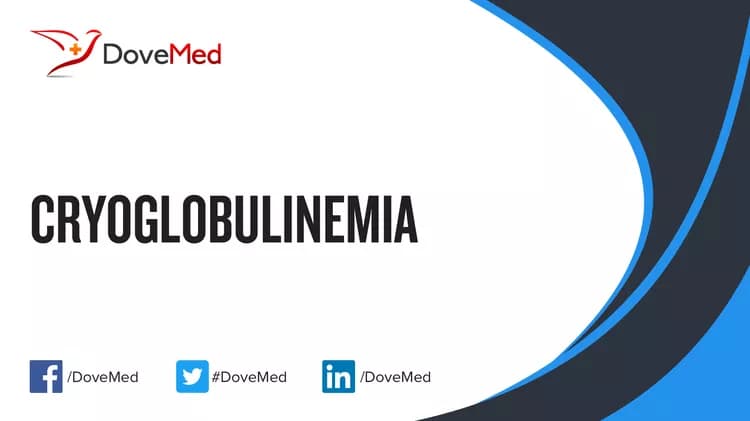What are the other Names for this Condition? (Also known as/Synonyms)
- Cryoglobulinaemia
- Cryoglobulinemic Disease
What is Cryoglobulinemia? (Definition/Background Information)
- Cryoglobulinemia is a type of vasculitis that is caused by abnormal proteins (antibodies) in the blood called cryoglobulins. At cold temperatures, these proteins become solid or gel-like, which can block blood vessels and cause a variety of health problems
- Many people affected by this condition will not experience any unusual signs or symptoms. When present, symptoms vary but may include breathing problems; fatigue; glomerulonephritis; joint or muscle pain; purpura; Raynaud's phenomenon; skin death; and/or skin ulcers
- In some cases, the exact underlying cause is unknown; however, Cryoglobulinemia can be associated with a variety of conditions including certain types of infection; chronic inflammatory diseases (such as autoimmune disease); and/or cancers of the blood or immune system
- Treatment varies based on the severity of the condition, the symptoms present in each person and the underlying cause
(Source: Cryoglobulinemia; Genetic and Rare Diseases Information Center (GARD) of National Center for Advancing Translational Sciences (NCATS), USA.)
Who gets Cryoglobulinemia? (Age and Sex Distribution)
- Cryoglobulinemia can be observed in both children and adults
- Both males and females may be affected
- Worldwide, individuals of all racial and ethnic groups may be affected
What are the Risk Factors for Cryoglobulinemia? (Predisposing Factors)
The risk factors for Cryoglobulinemia are not well-established, but it is known to be associated with the following conditions:
- Certain infections
- Autoimmune disorders
- Lymphoma
- Malignancies affecting the immune system
It is important to note that having a risk factor does not mean that one will get the condition. A risk factor increases one’s chances of getting a condition compared to an individual without the risk factors. Some risk factors are more important than others.
Also, not having a risk factor does not mean that an individual will not get the condition. It is always important to discuss the effect of risk factors with your healthcare provider.
What are the Causes of Cryoglobulinemia? (Etiology)
- In some cases, the exact underlying cause of Cryoglobulinemia is unknown
- however, Cryoglobulinemia can be associated with a variety of conditions including certain types of infection; chronic inflammatory diseases (such as autoimmune disease); and/or cancers of the blood or immune system
(Source: Cryoglobulinemia; Genetic and Rare Diseases Information Center (GARD) of National Center for Advancing Translational Sciences (NCATS), USA.)
What are the Signs and Symptoms of Cryoglobulinemia?
Many people affected by this condition will not experience any unusual signs or symptoms. In some cases, the signs and symptoms of Cryoglobulinemia may include:
- Breathing problems
- Fatigue
- Glomerulonephritis
- Joint or muscle pain
- Purpura
- Raynaud's phenomenon
- Skin death and/or skin ulcers
(Source: Cryoglobulinemia; Genetic and Rare Diseases Information Center (GARD) of National Center for Advancing Translational Sciences (NCATS), USA.)
How is Cryoglobulinemia Diagnosed?
Cryoglobulinemia can be diagnosed through:
- Certain blood tests
- Examining a sample of skin (skin biopsy)
- Urine tests (urinalysis, particularly to look for blood in the urine)
- Taking images of the arteries (angiogram)
- Chest X-ray
- And/or, testing the function of the nerves in the arms or legs
(Source: Cryoglobulinemia; Genetic and Rare Diseases Information Center (GARD) of National Center for Advancing Translational Sciences (NCATS), USA.)
Many clinical conditions may have similar signs and symptoms. Your healthcare provider may perform additional tests to rule out other clinical conditions to arrive at a definitive diagnosis.
What are the possible Complications of Cryoglobulinemia?
The complications of Cryoglobulinemia may include:
- Kidney dysfunction
- Skin ulcers causing emotional stress due to cosmetic concerns
Complications may occur with or without treatment, and in some cases, due to treatment also.
How is Cryoglobulinemia Treated?
The treatment for Cryoglobulinemia depends on the cause and severity of this condition.
- Avoiding cold temperatures may be enough to treat mild cases
- Severe cases may be treated by taking medication to reduce the body's immune response (corticosteroids)
- Removing some of the blood and replacing it with fluid or donated blood (a process called plasmapheresis)
- By specifically treating diseases that may cause Cryoglobulinemia (such as hepatitis C)
(Source: Cryoglobulinemia; Genetic and Rare Diseases Information Center (GARD) of National Center for Advancing Translational Sciences (NCATS), USA.)
How can Cryoglobulinemia be Prevented?
- Currently, Cryoglobulinemia may not be preventable, in cases where the cause is unknown or genetic
- Regular medical screening at periodic intervals with tests and physical examinations are recommended
What is the Prognosis of Cryoglobulinemia? (Outcomes/Resolutions)
- Cryoglobulinemia is usually not deadly. The outcome usually depends on the condition causing Cryoglobulinemia as well as each person's response to treatments
- The outcome is not as good when a person's kidneys are affected
(Source: Cryoglobulinemia; Genetic and Rare Diseases Information Center (GARD) of National Center for Advancing Translational Sciences (NCATS), USA.)
Additional and Relevant Useful Information for Cryoglobulinemia:
The following DoveMed website link is a useful resource for additional information:
Related Articles
Test Your Knowledge
Asked by users
Related Centers
Related Specialties
Related Physicians
Related Procedures
Related Resources
Join DoveHubs
and connect with fellow professionals


0 Comments
Please log in to post a comment.